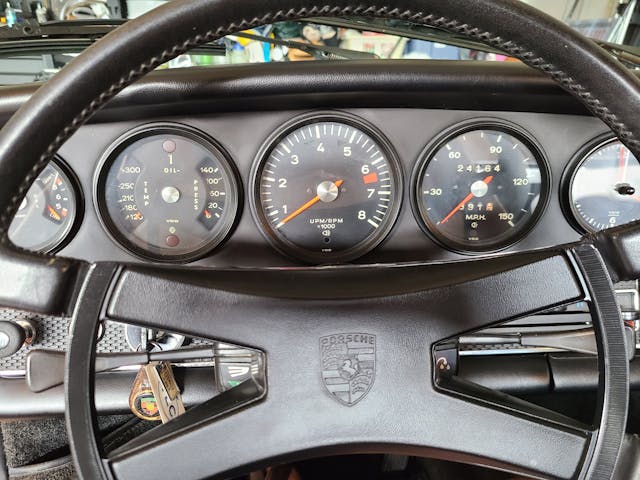Media | Articles
Porsche shifts its synthetic fuel project into high gear
Porsche is about to add “energy provider” to its resume.
Earlier in 2020, the German automaker caught us off-guard by announcing a significant investment in the development, production, and distribution of a synthetic fuel that can replace gasoline. Porsche sees this project as a way to keep classic cars on the road when and if fossil fuels are banned around the world. Bolstered by funding from Germany’s Ministry of Economic Affairs and Energy, it’s shifting the project into high gear. It teamed up with Siemens Energy, among other partners, to begin building a pilot factory in Chile, and it plans to start distributing its synthetic fuel in the coming years.
Intrigued, we talked with Michael Steiner, Porsche’s research and development boss, and Karl Dums, its head of advanced powertrain development and powertrain strategy, to learn more about the project’s ins and outs.
Why go synthetic?
Porsche’s main reason for investing nearly $25 million into the first phase of the project is simple. Regulators in Europe are making a concerted effort to jawbone gasoline and diesel out of the auto industry as quickly as possible.
“We have here in Europe the so-called Green Deal, which directs Europe in the direction of sustainability. We have targets for the automotive sector that are really tight. Synthetic fuels could help reduce the CO2 footprint of our automotive sector in Europe. This is one driver,” Steiner explained during a virtual roundtable discussion.
Marketplace
Buy and sell classics with confidence
And yet, lawmakers are venerating electric cars as a one-size-fits-all solution. In Europe, the flat-six, the V-8, and even the turbo-four are racing towards extinction in the not-too-distant future. Some argue these blanket bans are nonsense on stilts, while others welcome them like a well-stocked Christmas basket. Regardless of your view on this polarizing topic, the bottom line is that Porsche won’t be allowed to sell a gasoline-burning 911 anywhere in the United Kingdom after 2030. Volkswagen’s current and eighth-generation Golf GTI will likely be the last one British motorists can buy new—unless laws change, of course. Synthetic fuels haven’t entered the regulatory framework in a meaningful way yet, and that’s the second big reason why Porsche is moving forward with the project.
“The second driver is that politicians in Germany, as well as in Brussels, are discussing whether synthetic fuels will be allowed. Until someone shows what’s technically possible, and what effect importing synthetic fuels instead of fossil fuels has on sustainability, there could be no regulations allowing such things. We see a need for a real showcase to convince regulators that there should be room regulation-wise for synthetic fuels,” he told us.
From Chile, via ExxonMobil

Convincing international regulators that enthusiasts should be allowed to deviate from the EV fantasyland by firing up a 1974 Porsche 914 or a 1988 GMC Suburban once a week requires proving that synthetic fuels are made and transported in a sustainable manner. That’s why Porsche and its partners have chosen to put their first factory in southern Chile. You’d be hard-pressed to find a location that’s farther from Stuttgart, unless you sail down to Antarctica, but you’d also be hard-pressed to find one that’s so reliably windy, and wind-driven turbines will power the facility. Called Haru Oni, and shown above in a sketch, it’s currently under construction. Meanwhile, executives from Porsche and its partners are still hammering out the transportation-related details with key players in the maritime industry.
Once it disembarks in Europe, the synthetic fuel (a name for which hasn’t been decided yet) will be licensed to and supported by ExxonMobil. It’s a liquid, just like gasoline and diesel, so the firm will be able to distribute it via standard fuel pumps. It’s not too far-fetched to speculate the government’s blessing—assuming it’s received—will be accompanied by a tax; nothing suggests global leaders will brush aside such a piquant opportunity to make money. In turn, the type and amount of taxes applied to the synthetic fuel will dictate its cost to consumers.
“If you look at the price of fuel here in Europe, we’re paying between €1 and €2 per liter,” said Steiner. “In the mid-term, we see a chance to come close to this range in terms of cost before taxes are factored in, and this is very important. Its competitiveness in terms of price at the gas station will depend mainly on the question of what is the price tag for CO2, and how this new fuel will be taxed,” he warned.
For context, €1 per liter represents about $4.58 per gallon, while €2 is $9.16. Even without taxes, this fuel won’t be cheap. Whether it comes to the United States, where regulations are currently looser than on the other side of the pond, remains to be seen. Europe is the project’s target market as of this writing, but an American launch hasn’t been ruled out. Don’t forget that California wants to limit new car sales to zero-emissions models by 2035 at the latest.
Gasoline 2.0
Assuming the much-debated gasoline bans are enacted, and assuming Porsche’s synthetic fuel is elevated as a suitable replacement, what’s next? Nothing out of the ordinary, at least. You’d start your 911 back it out of your garage, drive to the nearest gas station, and fill it up just like you’ve always done.
“Our fuel specifications meet exactly the existing ones, so you could burn such fuel in a 993 without damaging the engine, and without making mechanical adjustments to it,” he said. What if you have, say, a Mercedes-Benz 300E? “I should not make assessments about other engines from other brands, but in Porsche cars it will work.”
Dums displayed more optimism about the possibility of putting Porsche fuel in a Benz.
“We are pretty sure that we meet the specifications, and therefore this fuel should work in every car which uses fuel within the existing specifications,” he replied. He also downplayed concerns about a decade’s worth of synthetic fuel chewing the valves. “I think the fuel quality is good enough that there are no long-term effects. As you know, fossil fuels also have some tolerances, and we don’t expect more effects than we have right now. Even less,” he stressed.
Right around the corner
Porsche CEO Oliver Blume previously sketched the outline of a fuel made by producing hydrogen, capturing carbon from the air, and combining both elements to end up with methanol, which is then transformed into a substitute for gasoline. It sounds science fiction-esque, but it’s happening, and it’s coming sooner than you might think.
“Our pilot plant will produce fuel in two years. We’ll have a capacity of about [34,000 gallons], but two years later we could scale up to [14.5 million gallons], and in another two years we could reach [145 million gallons] per year. We could produce a significant amount of fuel within this decade,” predicted Steiner.
Early on, the fuel will be primarily distributed at Porsche-related events, like international races and track days held at the Experience Centers it operates around the world. Steiner also brought up the possibility of sending every new gasoline-powered model the firm manufactures off the production line with a full tank of synthetic fuel.
What if, in 2045, you want to restore a 2016 Panamera powered by the mighty 4.0-liter V-8 diesel? Creating synthetic diesel using a similar process is possible, too, but Porsche is allocating its resources to replacing gasoline because it’s what powers the vast majority of the cars it has built (and raced) since the brand’s earliest days of production.
Porsche doesn’t miss an opportunity to point out that 70 percent of the cars it has built are still on the road. With synthetic fuel as a safeguard against the changes to come, it wants to ensure they stay there.





